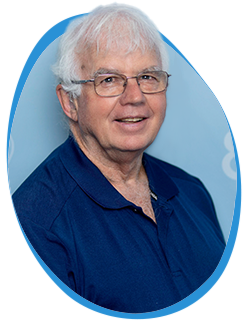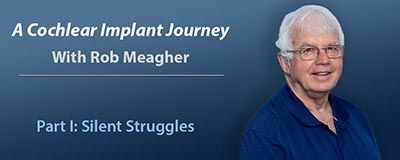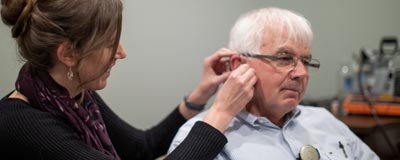A Hearing Story with Rob Meagher:
This is the first installment in a two part blog series speaking with Davidson Hearing Aid Centres’ own Rob Meagher. Rob is a Hearing Instrument Practitioner with over 35 years of experience, who has struggled with hearing loss his entire life and has worn hearing aids since the age of five. When Rob realized his hearing was getting worse and he was struggling to hear his customers, he decided to take the next step in his hearing journey by getting a cochlear implant. Rob shares the story of his journey and how cochlear implants continue to have a positive impact on his life.

Rob’s Pre-Cochlear Implant Journey
Managing severe hearing loss can be a frustrating, isolating experience. Constantly having to ask people to repeat themselves is no fun, and struggling to communicate with others can leave you feeling lonely.
For most people with hearing loss, hearing aids can be an effective treatment. But when hearing loss becomes very severe, making the decision to get cochlear implants can be life-changing. Take it from our very own Rob Meagher, who shares the story of his hearing loss journey before he made the decision to get a cochlear implant.
Rob’s Life Before Cochlear Implants
Rob began wearing hearing aids when he was just five years old. “I remember my mom telling me that when I was three years old, I used to ask her to turn around so I could read her lips. That’s where she kind of clued in.” Rob’s mom pushed for his doctors to give him a hearing test and in 1960, at five years old, he was fitted for his first set of hearing aids.
Although the hearing aids did help, when Rob was in school he still found it difficult at times to understand his teachers and hear other students. “You didn’t have the technology that we have today to give people microphones to help you to pick up what the teacher might be saying” Rob says of his experience in school. He has relied on lip-reading his whole life to help him understand speech.
Rob shares that his family and friends have always been understanding of his hearing loss. But when it came to interacting with strangers, he always struggled. Many strangers didn’t make the effort to communicate with him, and he could feel left out of conversations.
In large groups, Rob often felt like he was falling behind, especially when there were multiple conversations happening at once. Unless someone was speaking to him directly, it could be difficult for him to pick up on what was being said. This experience was a lonely and isolating one.
Rob had been wearing hearing aids his whole life and was certainly benefiting from advancements in their technology. However, as the clarity of his hearing decreased over time, he began to noticed that he was struggline more to hear his clients at the clinic. With many francophone clients in Eastern Ontario, he also found that even a slight accent made it more challenging for his brain to process the speech sounds. Especially if there were any other background noises. It became more common that he had to ask people to repeat themselves, and this struggle would leave him feeling exhausted at the end of the day. Rob says, “The clarity wasn’t there. It was getting weaker as I got closer to the date of making the decision.”
This is what motivated Rob to take the next step to improve his hearing loss – getting a cochlear implant. Stay tuned as we bring you part two of his story next month. But for the time being, here is some furhter information about cochelar implants.
What Are Cochlear Implants?
Cochlear implants are small, surgically implanted devices that can help to provide a sense of sound to individuals with severe to profound hearing loss.
Cochlear implants have an external component that sits behind the ear, as well as an internal component that is surgically inserted under the skin. The implant is equipped with a microphone that picks up sounds. A speech processor then arranges the sounds that are picked up by the microphone. The transmitter and receiver capture sound waves and convert them into electric impulses that are sent to the auditory nerve, which the brain interprets these impulses as sounds.
A cochlear implant is different from a hearing aid. While hearing aids amplify sounds, cochlear implants directly stimulate the auditory nerve.
Who Are Cochlear Implants Right For?
Cochlear implants are suited for children and adults who have severe to profound hearing loss with poor speech clarity. For children 18 months and younger, cochlear implants can provide the opportunity to learn sounds at an optimal time as they’re developing their language and communication skills. Cochlear implants can give children the opportunity to succeed in the classroom environment.
Adults who are no longer receiving benefit from properly fit hearing aids can often benefit from cochlear implants. There really isn’t an age limit for getting an implant and those well into their 70’s and 80’s can certainly still be candidates. Many adults who receive cochlear implants find that they can understand speech without needing to rely on lipreading.
Here at Davidson Hearing Aid Centres, we refer patients who may be a good fit for cochlear implants to the Ottawa Hospital cochlear implant team. They will assess each individuals candidacy and only candidates who are extremely likely to be successful with cochlear implants are selected to receive them. This means that almost everyone selected ends up hearing better than they did with just hearing aids. Keep in mind that the outcomes are very much individual, so success for one person might not look the same as success for someone else.
It’s also important to note that getting used to hearing with cochlear implants takes some time and therapy. It can be a bit of an emotional rollercoaster. Everyone’s journey with cochlear implants is different, and progress will depend on the amount of time the devices are used. But when your brain learns to hear with the cochlear implants, it’s worth the trouble. Many cochlear implant users like Rob state that the devices significantly improve their hearing and overall quality of life.
If you ar einterested in learning more about how Rob did with his cochlear implants, click this link to read Part II of his story.
How Davidson Hearing Aid Centres Can Support You
If you or a loved one is struggling with hearing loss, our team of hearing health professionals at Davidson Hearing Aid Centres would be honoured to be a part of your journey to better hearing. We are the oldest family-owned hearing aid clinic in Canada, and we have served our community for 80 years, helping people just like you hear better. We know that hearing devices are an investment, and we’re here to support you throughout the lifetime of your devices.
By providing comprehensive care and unwavering support, we strive to be a source of hope, guiding individuals towards a brighter future filled with the sounds of laughter, conversation, and connection.
If you have any questions that you think we can help answer, or if you’d like to schedule an appointment to find out whether you may be a candidate for cochlear implants, please feel free to call us at (613) 233-3149 or request a callback.






